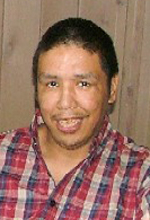 VANCOUVER -- A mentally retarded B.C. native who police mistakenly placed at the centre of the violent Gustafsen Lake standoff 10 years ago has died of hypothermia at the age of 34.
VANCOUVER -- A mentally retarded B.C. native who police mistakenly placed at the centre of the violent Gustafsen Lake standoff 10 years ago has died of hypothermia at the age of 34.Joseph Ignace, affectionately called Jo-Jo by his friends, was found last week frozen to death in about 15 centimetres of snow, 2½ weeks after running away from a supervised group home in Abbotsford.
Mr. Ignace became well known in B.C. after he faced the most criminal charges of 18 defendants arrested after the 31-day Gustafsen Lake confrontation. The charges were based mainly on a confession that was later shown to be false. A jury acquitted him of all charges after evidence showed he had severe fetal alcohol syndrome and was hundreds of kilometres away at a crucial moment.
"He was not dealt a very good hand in life," his lawyer at the trial, George Wool, of 100 Mile House, said yesterday in an interview.
"He was a person with a very serious mental disorder, a personality of a four-year-old. He could not count past four," he said. "It was such a tragedy what happened to him. . . . he should never have been prosecuted in the first place."
A group of natives in the summer of 1995 took over ranchland next to Gustafsen Lake in remote B.C. for a traditional sun dance, claiming the land was a sacred ancestral site. The police were called to evict them in August.
The RCMP identified Mr. Ignace as a major figure in the confrontation on two occasions. The Mounties accused Mr. Ignace of firing a shot at an RCMP officer on Aug. 18, 1995, that significantly escalated the historic confrontation. Also, in a highly unusual move on Sept. 11, 1995, the RCMP published extensive details of Mr. Ignace's record in youth court as part of a statement about the involvement of criminals in the occupation.
Mr. Ignace's body was found on Dec. 7 in a wooded area east of Hope on the edge of Manning Park.
He had been trying to hitchhike to his family's home in Chase, 340 kilometres northeast of Abbotsford. "It looks like he sat down by some trees to rest and that is where he was found," Cam Dore, executive director of the society that operates the group home, said yesterday in an interview.
Mr. Ignace had warm clothing that he left behind at the home. He likely did not anticipate the low temperatures, Mr. Dore said.
Mr. Ignace moved into the community home in Abbotsford six years ago. The home offers 24-hour supervision but does not lock in residents. Mr. Ignace disconnected an alarm before sneaking out, Mr. Dore said.
Mr. Ignace had tried to leave and head home several times, Mr. Dore said. "He would hear voices, and every once in a while he decided he had to leave and get back home."
Mr. Ignace's father, Wolverine, who is also known as Jones William Ignace, said in an interview that his son's mental capacities were severely damaged by his treatment by the police, prosecutors and court. Although he had fetal alcohol syndrome, he was worse off afterwards, Wolverine said.
"I'm very proud of that young man," Wolverine said. "He never backed down, despite all those odds which were very great against us. He held his ground. That's what I call a true warrior."
"He loved the mountains, he loved to be in the mountains," his mother, Flo Sampson, said. "I'm feeling awfully bad that he is gone."